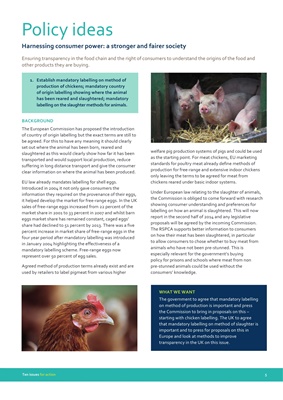
5
Ten issues for action
BACKGROUND
The European Commission has proposed the introduction
of country of origin labelling but the exact terms are still to
be agreed. For this to have any meaning it should clearly
set out where the animal has been born, reared and
slaughtered as this would clearly show how far it has been
transported and would support local production, reduce
suffering in long distance transport and give the consumer
clear information on where the animal has been produced.
EU law already mandates labelling for shell eggs.
Introduced in 2004 it not only gave consumers the
information they required on the provenance of their eggs,
it helped develop the market for free-range eggs. In the UK
sales of free-range eggs increased from 22 percent of the
market share in 2001 to 33 percent in 2007 and whilst barn
eggs market share has remained constant, caged eggs'
share had declined to 51 percent by 2013. There was a five
percent increase in market share of free-range eggs in the
four year period after mandatory labelling was introduced
in January 2004 highlighting the effectiveness of a
mandatory labelling scheme. Free-range eggs now
represent over 50 percent of egg sales.
Agreed method of production terms already exist and are
used by retailers to label pigmeat from various higher
welfare pig production systems of pigs and could be used
as the starting point. For meat chickens, EU marketing
standards for poultry meat already define methods of
production for free-range and extensive indoor chickens
only leaving the terms to be agreed for meat from
chickens reared under basic indoor systems.
Under European law relating to the slaughter of animals,
the Commission is obliged to come forward with research
showing consumer understanding and preferences for
labelling on how an animal is slaughtered. This will now
report in the second half of 2014 and any legislative
proposals will be agreed by the incoming Commission.
The RSPCA supports better information to consumers
on how their meat has been slaughtered, in particular
to allow consumers to chose whether to buy meat from
animals who have not been pre-stunned. This is
especially relevant for the government's buying
policy for prisons and schools where meat from non
pre-stunned animals could be used without the
consumers' knowledge.
Policy ideas
Harnessing consumer power: a stronger and fairer society
Ensuring transparency in the food chain and the right of consumers to understand the origins of the food and
other products they are buying.
1. Establish mandatory labelling on method of
production of chickens; mandatory country
of origin labelling showing where the animal
has been reared and slaughtered; mandatory
labelling on the slaughter methods for animals.
WHAT WE WANT
The government to agree that mandatory labelling
on method of production is important and press
the Commission to bring in proposals on this -
starting with chicken labelling. The UK to agree
that mandatory labelling on method of slaughter is
important and to press for proposals on this in
Europe and look at methods to improve
transparency in the UK on this issue.